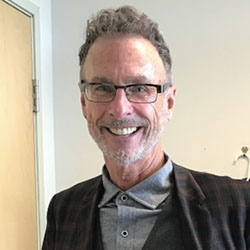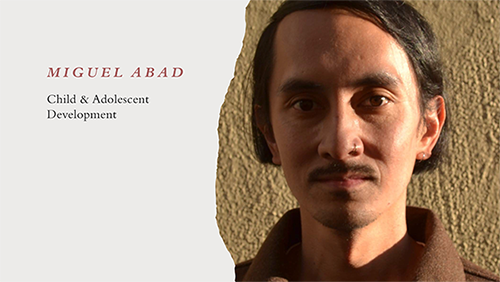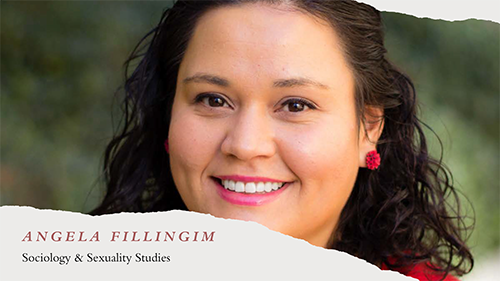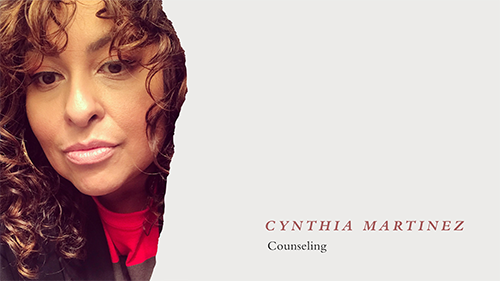New tenure-track faculty discuss importance of being authentic selves in scholarship
- Read more about New tenure-track faculty discuss importance of being authentic selves in scholarship
Many students and faculty members view San Francisco State University and the city in which it is located as sharing a unique spirit of social justice and progressivism.
Cynthia Martinez, an assistant professor in SF State’s Department of Counseling, was drawn to SF State by the community, the spirit of activism and her department colleagues. She grew up hearing stories from her parents — who immigrated here from Guatemala — about coming to the Bay Area in 1967 and seeing the Black Panther Movement, Civil Rights Movement and Harvey Milk. “The spirit of San Francisco State has that, with ethnic studies and the inclusivity it is connected to,” she said.
Her scholarship interests lie in participant action research, including working with BIPOC families to create non-traditional therapeutic wellness groups and trauma-informed, antiracist advocacy and radical self-care for practitioners experiencing collective trauma.
Martinez appreciates her colleagues’ receptivity to her teaching style and her pedagogical frameworks centered on community organizing, popular education, trauma-informed clinical/school supports, decolonizing critical praxis and anti-racist advocacy. The reason for this, she said, is “because they themselves are striving to create an open and inclusive learning community for our students. And I deeply respect the work they have done.”
Albert de la Tierra, an assistant professor in Criminal Justice Studies, was drawn to SF State because of his department and its explicit attention to structures of power. Meeting the faculty in the Department of Criminal Justice Studies helped him decide that SF State was where he wanted to build a career.
"The collegial culture that my senior colleagues and my department have built — because of the intentions they have to recognize, honor and value each other's humanity first, and to build constructive criticism from that appreciation of each other's perspectives — pushed me towards SF State,” said de la Tierra.
De la Tierra holds a Ph.D. and M.Phil. in Sociology from the CUNY Graduate Center, a B.A. in Criminology, Law & Society from UC Irvine, and advanced certificates in the Psychology of Leadership (Cornell), Critical Theory (CUNY), and Women's Studies (CUNY). He has years of experience teaching introductory and advanced undergraduate courses on qualitative research design, criminal justice studies and various sociological theories. He tailors coursework to students’ positionalities to promote their ability to interrogate the culture(s) in which they live.
The two faculty members were asked to consider the above quote from Audre Lorde and how it applies to their work. Both expressed that focusing on being their authentic selves in their scholarship is vital. Martinez says this is something she has struggled with in terms of traditional research, which is often quantitative and framed in a way that is “for the community, not with the community.” Being trained as an activist community organizer, going into the field of psychology, and seeing people writing about multiculturalism and thinking about social justice, she aims to find ways to lift the voices of the communities she works with.
Martinez emphasizes the question she asks herself: “How can we bring the spirit of the families we are working with, and the activism of the people whom I learn from and continue to learn from?” While reading the book “All About Love: New Visions” by bell hooks, she was inspired by the idea that love is a verb, an action. This quote helps answer her question, "I feel most powerful when talking about this because it is grounded in my communities, in families, and is founded in a lot of love.”
For de la Tierra, “daring to be powerful” means thinking about love and respect and analyzing scholarship, which can include problematic ideals. He says he considers it essential to be honest with the people he works with and those in his scholarship; he targets their work to demonstrate to his discipline that their work warrants a close reading and examination. “I want to push my people, my folks, beyond the frameworks that they are producing and reproducing.”
“Daring to be powerful is taking the risk of alienating myself from the small number of communities that I have in academia,” de la Tierra continues. He notes that it is easy to criticize backward frameworks or people one does not necessarily like. However, the whole goal behind academia and scholarship is to find colleagues who understand each other. “We are not here to only say what is good about what we do; the best thing I can offer and someone else can offer me is constructive criticism.”
Diversity, equity and inclusion (DEI) are frequently discussed in higher education, and SF State has long championed those values. On the subject of DEI in her own life, Martinez shares, “I live it every day, and so there is not a break… systemic oppression is a trigger of insidious trauma.” She focuses on intersectionality in how power differences play out in our lives and in the context of being Latin/Latinx/Latina. “What does that [intersectionality] mean when it has been grounded in anti-Blackness and anti-Indigeneity? … I often think about this in terms of identity, and it means intersectionality and how it comes across in class, race and gender.”
As people of color, both Martinez and de la Tierra have lived their whole lives contemplating not only DEI but also exclusion, marginalization, racism and the violence of the state through microaggressions. De la Tierra adds, “I have been reflecting on how I combat white supremacy in my community, how I subscribe to white supremacy ideologies without actually knowing, and how to work to undo that.”
De la Tierra believes that higher education aids in cultivating people who ask questions, are genuinely curious to know more and have the courage to question their beliefs and truths. “You can learn almost anything online… but the promise of being at a university, especially ours, is that you will be in a room with people who dedicated their life to becoming critical thinkers,” he said.




